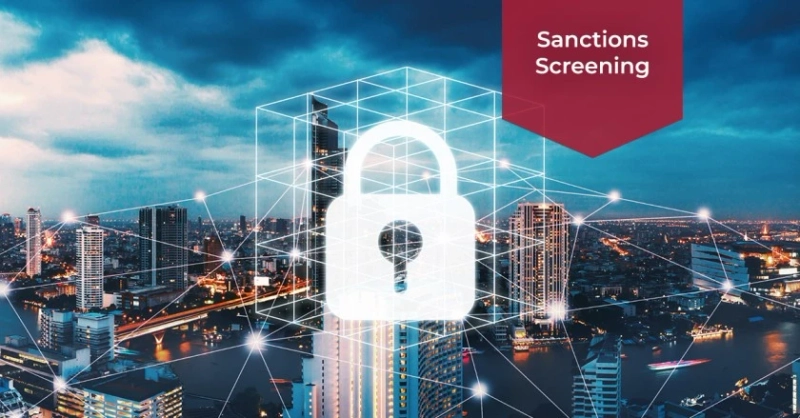Introduction
In an era where financial transactions traverse boundaries with a single click, the fight against international financial crime remains more difficult. Criminals exploit the anonymity and speed of the digital age to conduct illegal activities and launder money. As per a Financial Times report, money laundering fines saw a 50% surge in 2022. However, with multiple sanctions lists to take into account and numerous regulatory compliance to follow, institutions are on a continuous search for quick assistance to manage these complicated procedures. The Anti-Money Laundering (AML) compliance has emerged as a support that guides financial institutions in tackling these challenges with robust sanction screening efforts. In this post, we'll offer a thorough guide to Sanction List Screening, its significance, its difficulties, and the most effective ways to stay compliant with the latest regulations. By the end of this blog, you'll know more about how to keep your company safe from financial crime and handle the complications of sanctions screening.
What Are Sanctions & Sanctions Lists?
Sanctions are proactive measures enforced by the government applied to countries, entities, or individuals involved in actions considered unacceptable by the international community, often involving violations of international laws, human rights abuses, or security threats. The Global sanction list consists of countries, companies, and individuals with a documented history of engaging in financial crimes, making them high-risk entities for financial institutions.
What Is Sanction Screening?
Sanctions screening involves checking individuals and entities against government and international sanctions lists and watchlists. This screening identifies individuals, and companies subject to sanctions due to criminal reasons such as war engagement, money laundering, narcotics trafficking, terrorism, human rights abuses, and weapons proliferation, among others.
Sanctions And Regulatory Bodies
The relevant sanctioning bodies vary based on a business's operational regions and partnerships, with some of the prominent ones being:
HM Treasury sanctions: Applicable to individuals and legal entities within the UK.Office of Foreign Assets Control (OFAC): Applicable to all US citizens worldwide, businesses operating, and entities in the US.United Nations Security Council: Encompasses all UN member states.New York Department of Financial Services (NYDFS): Regulates financial institutions in New York.Financial Conduct Authority (FCA): An independent regulator overseeing the financial industries in the UK.EU Consolidated List of sanctions: Applies to all EU citizens, regardless of their current location, and legal entities in the EU.Why Complying With Sanctions Lists Is Crucial
In Navex Global's 2023 Report, 83% of risk and compliance professionals expressed that maintaining their organization's compliance with applicable laws, policies, and regulations is a highly significant factor in their decision-making procedures.
Hence, every business bears the responsibility of adhering to sanctions checklist screening to maintain compliance, and the consequences of not doing so can be financially burdensome. For instance, Wells Fargo Bank was issued with an enormous $97.8 million fine in March 2023 by the US Treasury for breaching US sanctions laws. In an interval of just two months, the cryptocurrency company Poloniex agreed to pay $7.6 million in an agreement with the OFAC for breaking 66,000 sanctions.
Therefore, compliance with sanctions lists and watchlists is of utmost importance as it ensures that businesses and legal entities avoid engaging with government-sanctioned entities or individuals. Now, get a quick overview of multiple challenges that make sanction screening a complicated process.
Challenges Effect Efficient Sanction Screening
Constantly changing sanctions regulations make it challenging for organizations to stay compliant.Handling vast amounts of data from various sources and formats can be complex and error-prone.Conducting real-time screening requires advanced technology and Autonomous Sanctions List processes.Sanctions may affect legitimate business operations, necessitating careful management.Identifying beneficial owners of entities can be challenging and may involve complex ownership structures.High rates of false positive alerts can disturb compliance teams and waste resources.Ensuring sanctions lists cover international entities and individuals can be difficult.Although screening is intricate, it's time to get informed on how efficient technical advancements and sanction list screening software streamline the sanction process.
Advances Of Compliance Landscape
Financial institutions can handle evolving risk management and compliance frameworks with these trends and practices in screening :
Advanced Technology including AI, ML, and NLP enhance screening accuracy, adapt to risks, and process unstructured data.Global sanctions compliance considers expanding sanctions checklist screening and responding to geopolitical events.Robust enhanced due diligence procedures verify beneficial ownership and include continuous customer behavior monitoring.Maintain data privacy and security, aligning with GDPR and cybersecurity measures.Customized risk-based approaches efficiently allocate resources.Ensuring AML compliance and blockchain monitoring in cryptocurrency transactions.An Automated sanctions list screening system reduces errors and enhances efficiency.Due diligence on vendors and partners ensures higher screening standards.Comprehensive audit and documentation adapt to evolving regulatory requirements for smooth operations.In the end, Sanction list screening is a significant aspect of AML compliance, following various government regulations for smooth operations. For a secure financial landscape, it cross-checks customer data against regulatory sanctions lists and helps prevent transactions with sanctioned parties. Fortunately, AML Watcher provides an all-encompassing AML screening solution that includes a real-time Automated sanctions list screening solution, adverse media screening, PEP screening, ongoing monitoring, and case management. Technological advancements have made this screening efficient and scalable, offering organizations the agility they need. Therefore, AML Watcher sanctions screening ensures accurate AML compliance. Contact us today and start your risk-free AML compliance journey with us.



